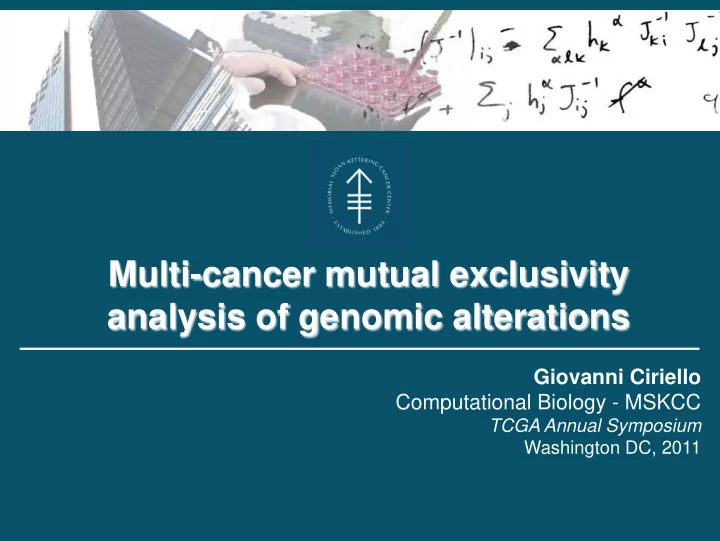

Multi-cancer mutual exclusivity analysis of genomic alterations Giovanni Ciriello Computational Biology - MSKCC TCGA Annual Symposium Washington DC, 2011
Mutually exclusive alterations in Cancer Recurrent genomic alterations target specific pathways Evading Growth Suppressors Resisting Cell Death Functional alterations targeting the same pathway frequently occur in a mutually exclusive manner (TCGA, Nature, 2011)
MEMo: Mutual Exclusivity Modules (Ciriello et al., Genome Res. 2011)
MEMo results on TCGA Datasets MEMo has been applied to the following TCGA projects: • Glioblastoma Multiforme (GBM) • Phase 2 338 samples • Serous Ovarian Cancer (OVCA) • Updated dataset 384 samples • Colon and Rectum Adenocarcinoma (COAD) • Non hyper-mutators 151 samples • Uterine Corpus Endometriod Carcinoma (UCEC) • Non serous / Non hyper-mutators 144 samples • Invasive Breast Cancer (BRCA) 463 samples Mutually exclusive patterns of alteration identified in several oncogenic pathways: • Rb - signaling • p53 - signaling • DNA repair • PI(3)K/Akt signaling
MEMo results on TCGA Datasets MEMo has been applied to the following TCGA projects: • Glioblastoma Multiforme (GBM) • Phase 2 338 samples • Serous Ovarian Cancer (OVCA) • Updated dataset 384 samples • Colon and Rectum Adenocarcinoma (COAD) • Non hyper-mutators 151 samples • Uterine Corpus Endometriod Carcinoma (UCEC) • Non serous / Non hyper-mutators 144 samples • Invasive Breast Cancer (BRCA) 463 samples Mutually exclusive patterns of alteration identified in several oncogenic pathways: • Rb - signaling • p53 - signaling • DNA repair • PI(3)K/Akt signaling
Mutual exclusivity in PI(3)K/Akt
Mutual exclusivity in PI(3)K/Akt
PI(3)K/Akt alterations in Ovarian Carcinoma MEMo does not find PI(3)K/Akt modules Search restricted Alteration Frequency to frequent events Genes
PI(3)K/Akt alterations in Ovarian Carcinoma MEMo does not find PI(3)K/Akt modules Search restricted Alteration Frequency to frequent events Genes Are there low-frequency but functional events affecting this pathway?
Multiple Low-frequency events target PI(3)K pathway 24% Altered Samples
Breast Cancer (463 samples)
Basal vs. Not Basal
Basal vs. Not Basal Samples with alterations at PI(3)K/Akt Is the PI(3)K pathway altered by other means in Basal tumors?
PTEN is down-regulated in Basal Breast Cancer • PTEN is down-regulated in Basal tumors 10% of Basal Tumors
PTEN down-regulation activates Akt • PTEN is down-regulated in Basal tumors • Down-regulated samples show higher Akt phosphorylation 10% of Basal Tumors
AKT3 is over-expressed in Basal Breast Cancer AKT3 in Basal Breast Cancer 30% of Basal Tumors
Overall Extent of Alteration 0% 100%
Conclusions • MEMo systematically identifies mutually exclusive alterations targeting oncogenic pathways across multiple cancer types • PI(3)K /Akt signaling is consistently altered in cancers, with different extents of alteration , and by different mechanisms • Mutual exclusivity analysis across multiple cancers unveils the underlying heterogeneity of the disease, thus suggesting candidate therapeutic targets in different subtypes
Thanks! Chris Sander Niki Schultz Ethan Cerami Jianjiong Gao Nils Weinhold Serena Bradde Rileen Sinha ... and everyone at cBio!
Recommend
More recommend